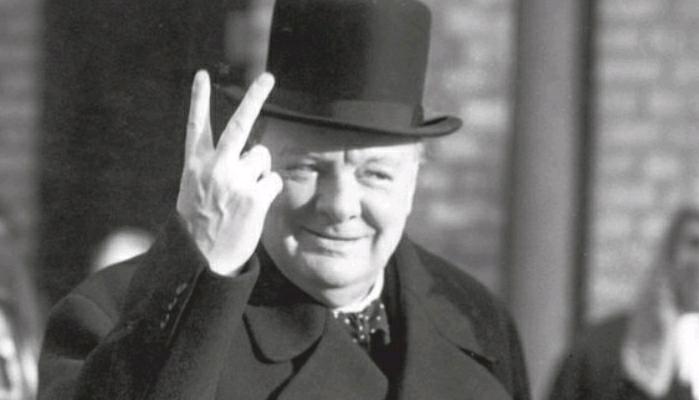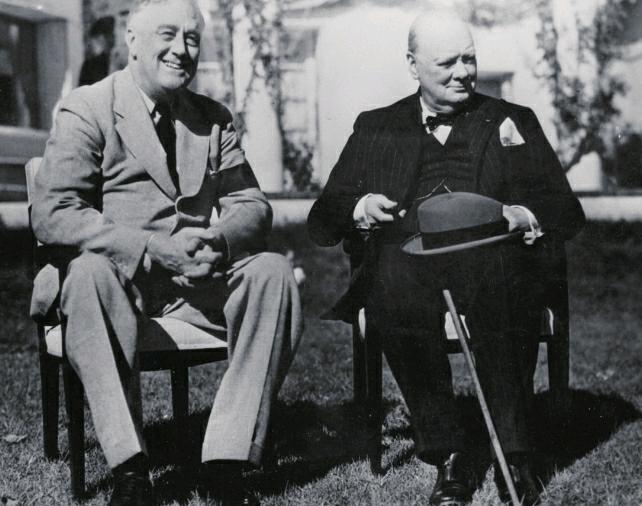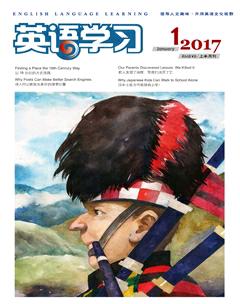丘吉尔的语言艺术
By+Tom+Vitale
W inston Churchill is best remembered as the British prime minister whose speeches rallied a nation under a relentless Nazi onslaught in World War II.2 But few people know that he won the Nobel Prize in Literature3—in part for his mastery of speechmaking.
Though he went on to win the Nobel Prize in Literature, Churchill didnt always excel4 in school. His 1884 school report card states young Winston is “very bad... a constant trouble to everybody,” and unable to be “trusted to behave himself anywhere.”5
On May 13, 1940, three days after Germany invaded France, Churchill gave his first speech as prime minister to the House of Commons,6 a speech that was later broadcast to the public. “I have nothing to offer but blood, toil, tears and sweat,” he said, as he helped the country brace for hard times.7
“Winston Churchill managed to combine the most magnificent use of English—usually short words, Anglo-Saxon8 words, Shakespearean,”says Andrew Roberts, author of a history of World War II called The Storm of War. “And also this incredibly powerful delivery. And he did it at a time when the world was in such peril3 from Nazism, that every word mattered.”
In another landmark speech, Churchill proclaimed:10“You ask, what is our aim? I can answer in one word: victory. Victory at all costs. Victory in spite of all terror. Victory, however long and hard the road may be, for without victory there is no survival.”
Before he became prime minister, Churchill had already written an acclaimed four-volume history of World War I.11 After World War II, he wrote a six-volume memoir12. His historical writings, along with his speeches, earned him the Nobel Prize in Literature.
Declan Kiely, curator of manuscripts at the Morgan Library, points out Churchills 1953 Nobel Prize citation, a gilt booklet that accompanies the gold Nobel Medallion.13 He describes it as “a modern illuminated14 manuscript.”
The citation, Kiely says, is wonderful. Translated from the Swedish it reads: For his mastery of historical and biographical description, as well as for brilliant oratory in defending exalted human values.15
Churchill wasnt born a master orator—he overcame a childhood lisp by practicing enunciation.16 He understood the power of words early in his career.
As a 23-year-old British soldier in India, Churchill wrote an essay called “The Scaffolding of Rhetoric.”17 The original manuscript is in the Morgan exhibition.
“The climax of oratory is reached by a rapid succession of waves of sound and vivid pictures,” Churchill wrote.18
“Those are the kinds of things you see 40 years later,” says Kiely. “Hes using these vivid pictures and these great, successive waves of sound.”
You can hear the way he employed these rhetorical methods in the weekly radio address he gave on Sept. 11, 1940, as he responded to Hitlers merciless aerial assault19 on London:
This monstrous product of former wrongs and shame has now resolved to try to break our famous island race by a process of indiscriminate slaughter and destruction.20 What he has done is to kindle a fire in British hearts which will glow long after all traces of the conflagration he has caused in London have been removed.21
Churchill wrote every word of his many speeches—he said he spent an hour working on every minute of a speech he made. At the Morgan Library are several drafts of a single speech from February 1941, when England stood alone against the Nazi onslaught and Churchill appealed to President Roosevelt22 for aid. The first draft looks like a normal typescript; the final draft, says Kiely, “looks like a draft of a poem.”
Churchill made those markings, Kiely explains, to indicate how the speech should be delivered. He inserted23 white space to remind himself to pause.
Churchill asked: “What is the answer that I shall give, in your name, to this great man, the thrice-chosen24 head of a nation of a hundred and thirty millions?”
Here, lots of white space is inserted into the final draft.
“Here is the answer which I will give to President Roosevelt.”
Another long pause, and then he said:
Put your confidence in us. Give us your faith and your blessing, and under Providence25, all will be well. We shall not fail or falter26. We shall not weaken or tire. Neither the sudden shock of battle, nor the long-drawn trials of vigilance and exertion will wear us down.27 Give us the tools, and we will finish the job.
Historian Andrew Roberts says the impact of Churchills speeches cannot be underestimated28. “An awful lot of people thought that it was impossible to beat the Nazis,” Roberts says. “Yet what Winston Churchill did, by constantly putting Britains peril in the greater historical context of other times that Britain had nearly been invaded, but had been ultimately successful, he managed to tell the British people that this could happen again.”29
On April 9, 1963, President John F. Kennedy summed up Churchills speechwriting achievements, saying, “In the dark days and darker nights when England stood alone—and most men save Englishmen despaired of Englands life—he mobilized the English language and sent it into battle.”30
On June 18, 1940, immediately after the fall of France, Churchill rallied31 the British people once more. With his characteristic Shakespearean gusto32, he declared, “Let us therefore brace ourselves to our duty, and so bear ourselves, that if the British Empire and its Commonwealth33 last for a thousand years, men will still say, ‘This was their finest hour.”
In 1938, Churchill said dictators34 were afraid of the power of words.“A state of society where men may not speak their minds cannot long endure35.”
1. Winston Churchill: 温斯顿·丘吉尔(1874—1965),英国前首相(1940—1945, 1951—1955)、政治家、作家,第二次世界大战期间领导英国人民对德作战并取得最终胜利,著有《第二次世界大战回忆录》、《英语民族史》等,获得1953年诺贝尔文学奖。
2. rally: 重新振作(元气、精神);relentless: 冷酷无情的;Nazi: 纳粹党的;onslaught: 猛攻。
3. Nobel Prize in Literature: 诺贝尔文学奖,诺贝尔奖是以瑞典化学家、炸药发明人阿尔弗雷德·诺贝尔的遗产作为基金创立的,自1901年开始,每年12月10日在诺贝尔的逝世日颁发,分设物理、化学、生理和医学、文学与和平五个奖项。
4. excel: 突出,胜过他人。
5. 根据1884年丘吉尔就读学校的学生评语卡,年少的丘吉尔“品行不良,经常制造麻烦”,并且被认为“走到哪里都不能规矩行事”。
6. invade: 侵略;House of Commons: 英国下议院,与上议院(House of Lords)相对。
7. toil: 辛苦劳作;brace for: 使振作,使准备迎接(困难)。
8. Anglo-Saxon: 盎格鲁-撒克逊的。盎格鲁-撒克逊人是古代日耳曼人的部落分支,于公元450年移民大不列颠岛,后与其他民族经过长期融合形成近代意义上的英格兰人。
9. peril: 险境。
10. landmark: 重要的;proclaim: 宣告,声明。
11. acclaimed: 被高度赞誉的;volume: 卷,册。
12. memoir: 回忆录。
13. curator: 馆长;manuscript: 手稿,后文出現的typescript是打印稿;citation: 嘉奖,赞词;gilt: 镀金的;booklet: 小册子(通常为纸面);medallion:大奖章,大勋章。
14. illuminated:(书籍等)用金色和鲜艳色彩装饰的。
15. 从瑞典语翻译过来就是:由于他在描述历史与传记方面的造诣,同时由于他那捍卫崇高的人类价值的杰出演说。biographical: 传记体的;oratory: 演讲术,雄辩术;exalted: 崇高的。
16. orator: 演说家;lisp: 咬舌,口齿不清;enunciation: 清晰的发音或念字。
17. scaffolding: 脚手架,框架;rhetoric:修辞学,雄辩术。
18. 丘吉尔写道:演讲的高潮是通过一连串迅速的声浪和生动的画面营造出来的。succession: 一连串,一系列,下段successive为其形容词形式,指“连续的,接连的”。
19. aerial assault: 空袭。
20. monstrous: 怪物般的,可怕的;resolve to do: 下决心,决定做;indiscriminate:(杀戮、破坏等)盲目随意的,不分青红皂白的;slaughter: 屠杀,杀戮。
21. kindle: 点燃(物质),煽动;trace:痕迹;conflagration: 战火,战争。
22. President Roosevelt: 指富兰克林·罗斯福(Franklin D. Roosevelt, 1882—1945),美国第32任总统,连任四届美国总统,病逝于第四届任期中。
23. insert: 插入。
24. thrice-chosen: 三次当选的。
25. Providence: 天意,天命。
26. falter: 动摇,畏缩。
27. trial: 磨难,艰辛;vigilance: 警惕,警戒;exertion: 努力,尽力;wear down: 使筋疲力尽。
28. underestimate: 低估。
29. 而丘吉尔所做的,就是通过不断地将英国所处的险境与那些险遭侵略但最终获胜的更严峻的历史时期作比较,成功地使英国人民认为一定能再次赢得胜利。
30. President John F. Kennedy: 约翰·肯尼迪(1917—1963),美国第35任总统;save: 除……之外;mobilize:动员。
31. rally: 集合。
32. gusto: 趣味,爱好。
33. Commonwealth: 英联邦。
34. dictator: 独裁者。
35. endure: 持续,持久。

